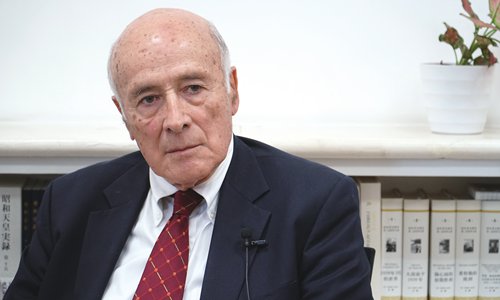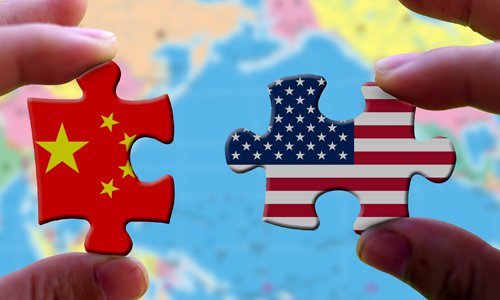
Joseph Nye Photo: Li Jieyi/GT
Where are China-US relations headed? Will the world enter a new cold war era? Can China rise peacefully? Global Times (GT) reporters Bai Yunyi and Yan Yunming talked to Joseph Nye (Nye), distinguished service professor at Harvard University and former US assistant secretary of defense for international security affairs, in an inclusive interview.
GT: US Vice President Mike Pence delivered a speech on China on October 24. It was hawkish in tone. But he also said that the US does not seek to "decouple" from China, and the two countries will meet a prosperous future together. What is the real message that he was trying to convey?
Nye: I think the important thing is to compare Pence's speech this year with the one he gave a year ago. Some people thought the one he gave a year ago was declaration of a new cold war. But the one he just gave last month said no decoupling. That is very important. One should pay attention to the fact that this speech said no decoupling.
GT: The trade war between the US and China has lasted more than a year. From your perspective, have American policymakers learned anything from this trade war?
Nye: The trade war is basically something which many people blame on President Donald Trump, but it has deeper roots than that. Many American businesses and many politicians, including democrats, felt that China has not been fair in trade, that it was giving subsidies to state-owned enterprises, and that it was coercing intellectual property transfer. This is basically a difficult set of issues to reconcile or sort out. The first round of the discussions may focus on agricultural products, but more difficult issues will be those related to technology, intellectual property, and state-owned enterprises.

Photo: IC
GT: How will the presidential elections next year impact the China-US relations and the trade war?
Nye: I think the style will be very different if President Trump loses, in the sense that he has a very idiosyncratic style, very self-centered. But I think the issues that I mentioned about - technology, intellectual property, and state-owned enterprises - are going to be there. Democrats are going to push those as well as the Republicans.
GT: It seems that the US is increasingly guarding against China in the ideological field. The NBA case can be a good example. Will this put US companies in a dilemma - they have to choose between commercial interests and political correctness?
Nye: There's a lot of criticism of the NBA. Afterwards the NBA has to say: Are we thinking just about the Chinese market or do we have to pay more attention also to our home market? So it will put pressure on not only the NBA, but on various companies. It's one thing for China to say, we'll protect our system at home. It's another thing to punish American companies when they say things back in the US. There was a lot of resentment that China was censoring free speech in the US when it punished the NBA.
GT: Does the NBA case show that China-US relations have entered an emotionally difficult period in which each side is inclined to think the worst about the other?
Nye: There is a danger that both sides are thinking the worst about each other, and it's something we should try to avoid.
I think it has been partly an accumulation over the years of various resentments, and also partly certain fears that Americans have about Chinese actions. I think there are also fears on the China side about US actions. And there is also a lot of nationalism in both countries. So it is a combination of these factors.
What can we do? More dialogue and more understanding of what the other side has. We have to accept that each of us has different systems, but we're going to have to agree to disagree in certain areas. And if China is seen in the US as censoring free speech in the US, that's going to create deep resentment, just as when the US criticizes human rights in China - that creates resentment here.
GT: There seems to be differences among US intellectuals on their attitude toward China. Some are optimistic about long-term US-China relations. Others believe that the two countries will fall into the Thucydides' trap. Which viewpoint do you think represents the mainstream? Which one will dominate the US policy toward China?
Nye: I think the important point is to realize that China does not present an existential threat to the US like Hitler did or like Stalin did. China is not trying to really destroy or change the American system. And the US doesn't present an existential threat to China. We're not trying to destroy China or Chinese system. So I think in the long run, if we can manage our problems, there need not be any conflict.
In the US there are some people who take the view of Graham Allison and John Mearsheimer - we are destined for war. But I would say most people don't think we're destined for war.
GT: So do you think China can rise in a peaceful way?
Nye: Definitely, China has already risen. If you look at the increase in Chinese economy and Chinese power, it has risen, and it has been peaceful.
The question is, in the future, some Americans think China is trying to expel the US from the Western Pacific, and they feel that this is going to bring conflict. I don't think China is trying to expel the US from the Western Pacific, but if you have the belief that that's China's aim - to replace the US and to remove the US, then you will take a much more suspicious view.
GT: Do you think a China-US trade agreement, once reached, will help reset bilateral relations? Or do you think we have already entered a new cold war era which will last for a long time?
Nye: Only partway. If the rumors are correct, that the trade deal is going to be primarily about agricultural goods, it doesn't solve these problems, which are really at the heart of the issue, which are the ones I mentioned about - intellectual property transfer, technology theft, and state-owned enterprises. These are the tough issues. And apparently they're not going to be in the first-phase trade deal. So if this trade deal is reached, it will help things somewhat. But it will not really solve the problem.
I don't think we have entered a new cold war era. I think the image of a Cold War is a bad metaphor, a bad image to use, because in the real Cold War, there was almost no trade between the US and the Soviet Union, and there were almost no social contacts. With the US and China, we know that there's a lot of trade, and we also know there are huge social contacts. There are like 375,000 Chinese students in the US, and maybe 3 or 4 million Chinese tourists. This is not a Cold War.
GT: You believe that the American century will last for decades. In these decades, will we continue to maintain the current US-dominated structure, or will multi-polarization become a more obvious trend?
Nye: I sometimes call it polycentric or multi-centered. Because I think the US will still be the most powerful country militarily and the largest economy. There are many areas where the US cannot guide things alone, and it is going to have to cooperate with other countries, like China, Europe, Japan, and so forth.
If you take new areas like how do we understand rules for cyber world and how do we handle problems like climate change, these are areas we are going to have to cooperate in. No country can do it alone - Whether it is China, or the US, or anybody.
GT: You once compared China to the US of the 1930s - It needs to increase its influence, rather than overthrow the existing international order. But some people compare China to Germany before World War I, which may eventually lead to a world war. How do you see this? What role is China playing in the existing international order?
Nye: I don't think China is trying to overthrow the international rules-based system, because China has benefited so much from it. If you look at China's growth, exports, and trade, you will see it has benefited very much from the international system. In the United Nations, China has a seat on the Security Council with a veto. This is not like Germany. This is very different.
China wants to make modifications to the international order to benefit itself, which is natural, but it's not trying to break the system.
You can think of the image or metaphor of a card game. China wants to see more cards dealt to itself and have more winnings. It doesn't want to kick over the table. Germany kicked over the table.
GT: We have noticed concerns rising in the West over "a future world dominated by China." We are very surprised by such an idea. Why does the West have such concerns? Are the US and some European countries losing confidence in facing a rising China?
Nye: It comes from the fact that very often the statements that people make can be misinterpreted or misunderstood. For example, when a Chinese national plan says China will be No.1 in artificial intelligence by 2030, it sounds good in China to a Chinese audience. If you're listening to that in Washington or Paris or London, it sounds like Beijing says we're going to be No.1, therefore you're going to be No.2 or No.3. And that then makes people fearful that China is trying to dominate.
So, there are problems that I call the "two audience" problem. Anytime a leader speaks, he has to say, not just the audience right in front of me, but what about that audience over there? How well do they hear? So I think some of the problems are because of not being careful enough about two audiences.
Other problems are what I call "hawks feed each other." So somebody who has a hawkish view about China in the US will pick up the reading or something said or written by, let's say, a colonel in the People's Liberation Army, who says "we are going to dominate East Asia" or whatever. And they will say this proves that China is out to dominate. But that may not be real Chinese policy. But the hawk in the US gets this statement by the hawk in China, and he uses it for his purpose. So I say this is "hawks feed each other across the border."
GT: So do you believe that we will have a world dominated by China in this century?
Nye: I don't think so. I think China will increase in its power. I think China will continue to prosper. But China can't rule the world. Neither can the US. It's going to require cooperation.
GT: In times of globalization, how will economic interdependence affect bilateral relations? It seems that such interdependence has not reduced frictions between countries. Why is that?
Nye: Economic interdependence doesn't guarantee peaceful relations in every area. Remember before World War I in 1914, Germany and England were each other's very best customers. So people sometimes make miscalculations, or other issues become politically salient.
In the case of Japan and Korea, this issue will basically go back to history. Japan's treatment of Korea when it colonized Korea has caused resentment which led to popular protests in Korea.
But in Japan, they say look, in 1965, we signed a treaty that we had arranged compensation for the things we've done wrong, and the Koreans are breaking this treaty. So both sides feel that they are right. And it then leads to economic disintegration or decoupling. So economic integration helps to give an incentive for states to reduce conflicts, but it's not perfect, and it doesn't always work.
GT: How should China and the US develop interdependent relations in the future to maintain stable and healthy bilateral ties?
Nye: I think both of us should realize that we benefit from economic interdependence, but not everybody in each country benefits.
Say you're a worker in Ohio, and your factory was closed because it was sent to China. The country, the US, may have benefitted, but you, the worker in Ohio, didn't benefit. That means that people in Washington should arrange compensation or trade adjustment for the worker in Ohio.
Similarly, there are going to be areas where technology raises issues of security. And we have to say on some of those areas where the transfer of the technology raises issues of security, we're going to have to agree that we will break or decouple in that area.
We don't want it to spread to everything. For example, people in the US say that if Huawei builds 5G in the US, it's a threat to our security. Chinese friends say, wait a minute, why are you being protectionist against Huawei? And the answer is, wait a minute, why isn't Google able to operate in China? or Facebook? So there are going to be areas where the US says this can't happen because of security, and China says that can't happen because of security.
What we have to do is to keep those very limited. So there will be some technological decoupling. We don't want it to spread to broad decoupling.
GT: Some American elites are pushing China-US relations toward more conflicts. But sections of American society, such as farmers, are opposing such hostility between the two countries. To what extent will the attitude of American society affect President Trump's policy on China?
Nye: On farm vote, which was a vote that went in favor of President Trump in 2016, I think they'll probably stay mostly with President Trump. On working class, some of those factories that closed because the factories went to China, they will probably continue to vote for President Trump.
But there will be many other issues in the election besides just the issue of China. I think the question now about impeachment, for example, is going to be important. Also, there are a lot of complaints that people have about President Trump's behavior as a president, which will also affect the outcome. So, the economic relations with China are one part of the effect on people's votes. I don't think it's the most important.

